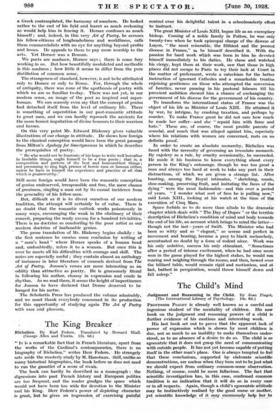The King Breaker
Richelieu. By Karl Federn. Translated by , Bernard Mall. (George Allen and Unwin. 12s. Cid.)
" IT is a remarkable fact that in French literature, apart from the works of the Cardinal's contemporaries, there is no biography of Richelieu," writes Herr Federn. • He strangely sets aside the masterly study by M. Haimtatix. • Still, unlike so many historical biographies, the book before us does not need to run the gauntlet of a score of rivals..
The book can hardly be described as a Monograph : the digressions into past French history and:European politics are too frequent, and the reader grudges the space which would not have been too wide for devotion to the Minister and his King. Herr Federn's power of depicting character is great, but he gives an impression of exercising painful control over his delightful talent in a schoolmasterly -effort to instruct.
The great Minister of Louis XIII. began life as an exemplary bishop. Coming of a noble family in Poitou, he was only twenty-two when he took episcopal charge of the diocese of Luton, " the most miserable, the filthiest and the poorest diocese in France," he himself described it. With the passion for hard work- which was born in him he devoted himself immediately to his duties. He chose and watched his clergy, kept them at their work, saw that those in high places did not escape to Paris to try their luck at Court in the matter of preferment, wrote a catechism for the better instruction of ignorant Catholics and a remarkable treatise enjoining gentleness on those who attempted the conversion of heretics, never pausing in his pastoral labours till his prescient ambition showed him a chance of exchanging the government of his diocese for the government of his country.
To transform the international status of France was the object of his life as Minister of Louis XIII. He attained it by war, by intrigue, by crushing taxation, and perhaps by murder. To make France great he did not care how much he made her suffer—and she " repaid him with fame and hate." These are, of course, the most prolific parents of scandal, and much that was alleged against him, especially where his relations with women 'are 'concerned, rests on no definite proof.
In order to create an absolute monarchy, Richelieu was faced with the necessity of governing an irresolute monarch. By cajolery as a rule, by cruelty occasionally, he succeeded. He made it his business to know everything about every person in the King's entourage. though he was too great a man and always too hard at work to take any part in their distractions, of which we are given a strange list. After hunting, among the Royal intimates, " sketching, music, shoe-making, preserving fruit, and imitating the faces of the dying " were the most fashionable—and this over a period of years. " I wonder what sort of face he is pulling now," said Louis XIII., looking at his watch at the time of the execution of Cinq Mars.
Space forbids -us to do more than allude to the dramatic chapter which deals with " The Day of Dupes " or the terrible description of Richelieu's condition of mind and body towards the end of his life, an account, which brings to mind the latter— though not the last—years of Swift. The Minister who had been so witty and so " elegant," so -serene and perfect in
movement and bearing, became a prey to black melancholy, accentuated no doubt by a form of rodent ulcer. Work was his only sedative, success his only stimulant. " Sometimes after a period of intense excitement, when he had once more won in the game played for the highest stakes, he would run roaring and neighing through the rooms, and then, bowed over the billiard table, would remain rigid and motionless, and at last, bathed in perspiration, would throw himself down and fall asleep."








































 Previous page
Previous page